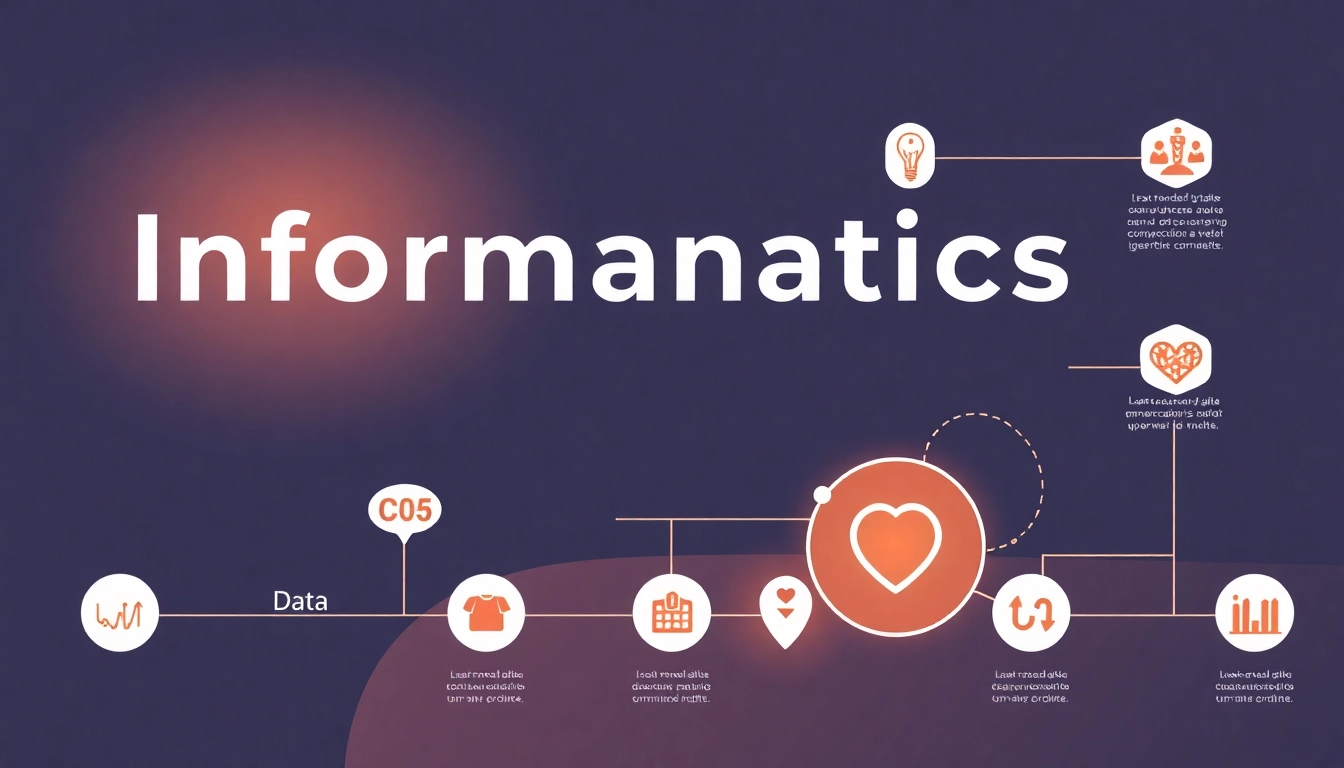What is Informatics?
Definition and Scope
Informatics is a multidisciplinary field that combines elements from computer science, information technology, and social sciences to analyze and apply data, information, and knowledge systems. The core concept revolves around the transformation of data into actionable insights across various domains, including healthcare, business, education, and more. The goal is to optimize how information is used to enhance decision-making and improve outcomes. A significant aspect of informatics is its application in real-life scenarios, where it directly impacts human experience and interaction with technology.
According to definitions provided by institutions such as the https://www.informaticsview.com, the field involves the study and application of systems that manage data to improve various processes. Informatics is not merely about technology integration; it focuses on the human aspect of technology, ensuring that systems created enhance user engagement and accessibility.
Historical Background
The roots of informatics trace back to the early applications of computers in the 1950s and 60s. Initially centered around data processing, the field has evolved significantly through advances in technology and the increasing necessity for data analysis. The term ‘informatics’ gained prominence in the 1970s, particularly in the medical field, where it began to be understood as a crucial component in improving healthcare delivery systems.
As computers became more sophisticated, the abilities to collect, store, and analyze large volumes of data led to a paradigm shift in various industries. The emergence of electronic health records (EHRs) in healthcare, for instance, exemplifies how informatics has transformed interactions between healthcare providers and patients. The field has seen continuous growth since, influenced by the ongoing digital transformation across all sectors of society.
Importance in Modern Society
The importance of informatics in today’s society cannot be overstated. As we generate vast amounts of data daily, the need to manage and utilize this information effectively has become a cornerstone of organizational success. Informatics enables organizations to harness data in ways that drive innovation, improve efficiency, and support better decision-making processes.
Moreover, informatics plays a crucial role in promoting data-driven healthcare, which enhances patient outcomes and streamlines operations. By integrating data analysis into clinical practice and administration, healthcare professionals can make informed choices that impact patient care positively, paving the way for a more effective health system.
Applications of Informatics
Informatics in Healthcare
In the realm of healthcare, informatics is revolutionizing how medical systems operate. Health informatics includes the design and application of technologies and systems that manage patient information, facilitating improved healthcare delivery.
One of the most significant applications is the use of Electronic Health Records (EHRs). These systems allow for the digitization of patient records, enabling healthcare providers to access and share patient information swiftly and securely. EHRs reduce the risk of errors associated with handwritten notes and increase efficiency in patient care.
In addition to EHRs, Clinical Decision Support Systems (CDSS) are integral to health informatics. These systems analyze data from various sources to provide healthcare professionals with evidence-based recommendations for diagnoses and treatments. For example, tools that alert clinicians to potential drug interactions based on a patient’s current prescriptions help prevent adverse events and enhance patient safety.
Business and Consumer Applications
Informatics extends its influence beyond healthcare into various business sectors. Organizations are utilizing data analytics to streamline operations, enhance customer satisfaction, and drive strategic decision-making. Business informatics helps analyze consumer behavior, enabling companies to tailor their offerings effectively.
For instance, customer relationship management (CRM) systems leverage informatics principles to maintain records of customer interactions. By analyzing purchasing patterns and preferences, businesses can develop targeted marketing strategies that resonate with consumers, leading to higher conversion rates and customer loyalty.
Furthermore, informatics aids supply chain management, where real-time data analysis optimizes logistics and inventory management. Companies can anticipate demand fluctuations and adjust their strategies accordingly, reducing waste and maximizing efficiency.
Informatics in Education
The educational sector is also experiencing transformation through informatics. Learning Management Systems (LMS) and digital tools are revolutionizing teaching methodologies and learning experiences. These platforms harness data to enhance the educational journey, offering tailored learning resources based on individual student performance and needs.
Adaptive learning technologies, for example, assess students’ progress and customize lesson plans accordingly. This personalized approach promotes student engagement and success, breaking down traditional one-size-fits-all education models.
Moreover, informatics improves administrative efficiency in educational institutions. Data-driven insights can inform policy-making and curriculum development, ensuring that learning objectives align with students’ needs and industry standards.
Challenges in the Field of Informatics
Data Privacy and Security
While the benefits of informatics are substantial, the field faces significant challenges, particularly concerning data privacy and security. With the increasing volume of sensitive information being managed, the risks of data breaches and unauthorized access have only heightened.
Organizations must implement stringent security measures, including encryption, access controls, and robust authentication protocols, to protect confidential information. Moreover, compliance with regulatory frameworks such as GDPR and HIPAA is essential to safeguard personal data and maintain consumer trust.
Training and educating employees on data security practices are also critical in mitigating risks associated with informatics. Awareness campaigns and regular training sessions can foster a culture of security within organizations, empowering employees to recognize potential threats and respond appropriately.
Integration of Systems
Another challenge in informatics is the integration of diverse systems and platforms within an organization. As various departments adopt different tools and technologies, the lack of interoperability can hinder data exchange and collaboration.
To address this, organizations must prioritize the development of standardized protocols and use of interoperable systems. Investing in middleware solutions that facilitate communication between existing applications can streamline workflows and enhance data sharing, ultimately leading to improved operational effectiveness.
Moreover, fostering collaboration among IT departments and end-users during system implementation ensures that the solutions provided cater to the actual needs of the workforce, enhancing user adoption and satisfaction.
Training and Education Gaps
Lastly, the informatics field faces a persistent challenge due to gaps in training and education. Rapid technological advancements outpace the current curriculum in many academic institutions, leaving graduates ill-prepared for real-world applications.
To overcome this, educational institutions should collaborate with industry leaders to develop curricula that reflect current practices and future demands. Hands-on learning opportunities, internships, and continual professional development for existing practitioners are vital in building a competent workforce equipped to navigate the complexities of informatics.
Best Practices for Implementing Informatics
Building User-Centric Systems
Implementing informatics effectively necessitates a focus on user-centric systems. Engaging users early in the design process ensures that the developed solutions cater to their actual needs and preferences. Understanding user interaction with systems can lead to the development of more intuitive interfaces and functionalities, improving overall satisfaction and efficiency.
Conducting user research and usability testing allows organizations to gather feedback directly from end-users. Iterative design approaches—where systems are developed in phases and continually refined based on user input—can result in innovations that genuinely resonate with users.
Effective Data Management Strategies
Effective data management strategies are crucial for successful informatics implementation. Organizations must establish data governance frameworks to oversee how data is collected, stored, and utilized throughout the system lifecycle. Proper categorization, labeling, and documentation of data can facilitate smooth access and retrieval.
Incorporating data quality measures ensures that data remains accurate, consistent, and relevant. Regular audits and validation checks can help maintain high-quality datasets, crucial for informed decision-making.
Furthermore, using advanced analytics and machine learning techniques can enhance data analysis capabilities, providing deeper insights and uncovering hidden patterns that can inform strategic direction.
Fostering Interdisciplinary Collaboration
Fostering interdisciplinary collaboration is vital in implementing successful informatics systems. Bringing together professionals from various fields—such as IT, healthcare, business, and education—encourages innovative solutions that transcend individual limitations.
Encouraging cross-functional teams allows organizations to leverage diverse perspectives and expertise, resulting in well-rounded systems that cater to a wider range of needs. Collaborative environments can be supported through regular workshops, brainstorming sessions, and interactive platforms that promote communication and idea exchange.
The Future of Informatics
Emerging Technologies
The future of informatics is poised for remarkable growth, primarily due to the emergence of new technologies. Artificial Intelligence (AI) and machine learning are at the forefront, enabling organizations to analyze massive datasets and extract valuable insights efficiently.
Furthermore, the Internet of Things (IoT) is set to revolutionize how data is collected and processed. Connected devices enable real-time monitoring and data gathering across various sectors, including healthcare, smart homes, and industrial applications. These technologies will foster a more data-driven culture, empowering organizations to make proactive decisions based on immediate insights.
Expected Trends in Healthcare Informatics
In healthcare specifically, several trends are emerging to reshape how services are delivered. Telemedicine has gained tremendous traction, providing remote access to healthcare professionals, thereby increasing convenience and accessibility for patients.
Another significant trend is the integration of AI in diagnostics and treatment recommendations. AI-powered tools are enhancing clinical workflows, reducing human error, and facilitating more precise patient care.
Additionally, personalized medicine is on the rise, where treatments and preventive measures are tailored to an individual’s genetic makeup and lifestyle, supported by data analytics and informatics.
Potential for Global Impact
The global impact of informatics holds immense potential. As countries continue to digitize their systems, the benefits of informatics can help drive economic growth, enhance public health, and improve educational outcomes. By leveraging data effectively, nations can better address societal challenges, leading to improved quality of life and sustainable development.
Moreover, informatics plays a crucial role in global health initiatives, allowing for better monitoring and response to health crises, be it in pandemics or chronic disease management. This global perspective emphasizes the significance of collaborative informatics strategies across borders, ensuring that all nations can benefit equally from technological advancements.



